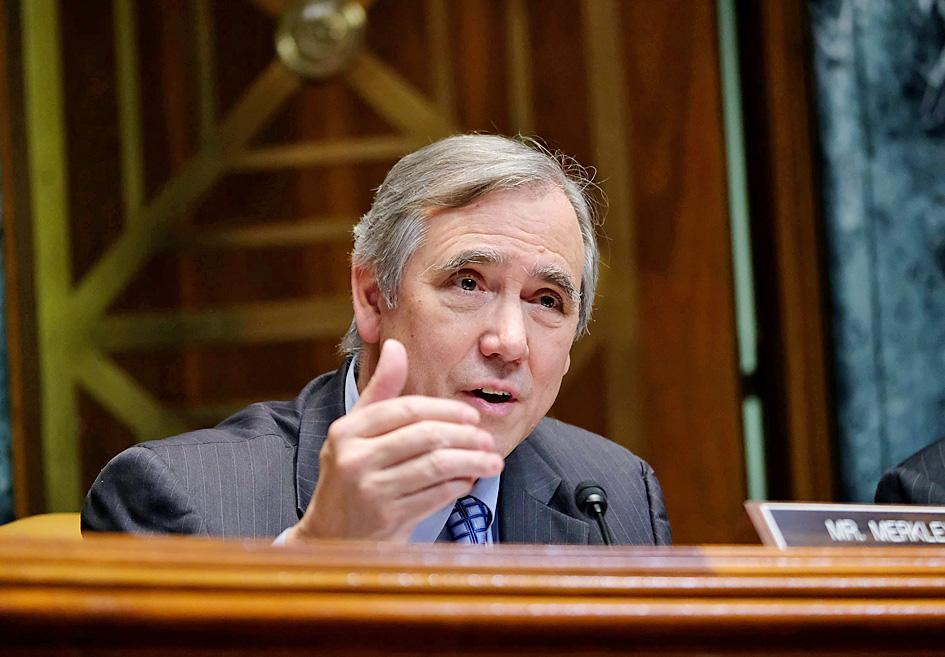The US House of Representatives’ China Task Force, launched by Republicans earlier this year, yesterday proposed the China task force act, a package of 137 pieces of legislation, seven of which involve Taiwan, in the hope of getting it passed before the 117th US Congress convenes on Jan. 3.
The act encompasses a wide range of issues, including combatting Beijing’s influence around the globe, establishing the US’ dominance in determining 5G network standards and means for bringing UN members to task for abusing their influence within the UN system.
The seven acts involving Taiwan address concerns such as the Taiwan Assurance Act reaffirming the regular sale of arms to Taiwan and supporting its meaningful participation in the UN and other international bodies, while the Taiwan defense act ensures that the US military has the capabilities to block Chinese Communist Party (CCP) aggression.

Photo: AFP
If passed, the Taiwan symbols of sovereignty act would allow Taiwanese to openly wave national flags on US soil and wear official uniforms carrying representations of the flag, while the Taiwan non-discrimination act would serve as a legal basis for helping Taiwan to join the IMF and the employment fairness for Taiwan act would encourage global financial institutions to hire Taiwanese on a fair basis.
The Taiwan fellowship act directs the US Department of State to establish a program to provide two-year fellowships in Taiwan to qualified US government employees, while the Taiwan relations reinforcement act, introduced by US senators Marco Rubio and Jeff Merkley, includes the establishment of an interagency Taiwan policy task force.
The acts also include House Resolution 353, a bill directing the US secretary of state to develop a strategy for Taiwan to regain observer status in the WHO.
The China Task Force said that two-thirds of the acts bundled under the China task force act have received bipartisan support, while the remaining one-third had either passed the Congress or the Senate.
US Representative Michael McCaul, chairman of the task force, said that Beijing’s malign behavior constitutes a threat that the US cannot ignore.
“The malign behavior of the CCP poses a generational threat that demands urgent action. We can no longer stand back as the Chinese Communist Party ramps up their military aggression, weaponizes the supply chain and brazenly attacks the democratic values that underpin American society and global prosperity,” McCaul said.
House Minority Leader Kevin McCarthy, when announcing the act, said: “Today marks another milestone in our efforts to hold China accountable — the introduction of the China task force act will help us implement the recommendations of the report, which will help make our country safer and more self-sufficient.”
Ministry of Foreign Affairs spokeswoman Joanne Ou (歐江安) said that the ministry thanked the US Congress for advancing concrete measures in support of Taiwan, and for giving significant weight to the issue of regional peace and stability across the Taiwan Strait.
The ministry would keep in close contact with the US Congress and its administrative branch to further foster Taiwan-US relations, Ou said.

CHAOS: Iranians took to the streets playing celebratory music after reports of Khamenei’s death on Saturday, while mourners also gathered in Tehran yesterday Iranian Supreme Leader Ayatollah Ali Khamenei was killed in a major attack on Iran launched by Israel and the US, throwing the future of the Islamic republic into doubt and raising the risk of regional instability. Iranian state television and the state-run IRNA news agency announced the 86-year-old’s death early yesterday. US President Donald Trump said it gave Iranians their “greatest chance” to “take back” their country. The announcements came after a joint US and Israeli aerial bombardment that targeted Iranian military and governmental sites. Trump said the “heavy and pinpoint bombing” would continue through the week or as long

TRUST: The KMT said it respected the US’ timing and considerations, and hoped it would continue to honor its commitments to helping Taiwan bolster its defenses and deterrence US President Donald Trump is delaying a multibillion-dollar arms sale to Taiwan to ensure his visit to Beijing is successful, a New York Times report said. The weapons sales package has stalled in the US Department of State, the report said, citing US officials it did not identify. The White House has told agencies not to push forward ahead of Trump’s meeting with Chinese President Xi Jinping (習近平), it said. The two last month held a phone call to discuss trade and geopolitical flashpoints ahead of the summit. Xi raised the Taiwan issue and urged the US to handle arms sales to

BIG SPENDERS: Foreign investors bought the most Taiwan equities since 2005, signaling confidence that an AI boom would continue to benefit chipmakers Taiwan Semiconductor Manufacturing Co’s (TSMC, 台積電) market capitalization swelled to US$2 trillion for the first time following a 4.25 percent rally in its American depositary receipts (ADR) overnight, putting the world’s biggest contract chipmaker sixth on the list of the world’s biggest companies by market capitalization, just behind Amazon.com Inc. The site CompaniesMarketcap.com ranked TSMC ahead of Saudi Aramco and Meta Platforms Inc. The Taiwanese company’s ADRs on Tuesday surged to US$385.75 on the New York Stock Exchange, as strong demand for artificial intelligence (AI) applications led to chip supply constraints and boost revenue growth to record-breaking levels. Each TSMC ADR represents

State-run CPC Corp, Taiwan (CPC, 台灣中油) yesterday said that it had confirmed on Saturday night with its liquefied natural gas (LNG) and crude oil suppliers that shipments are proceeding as scheduled and that domestic supplies remain unaffected. The CPC yesterday announced the gasoline and diesel prices will rise by NT$0.2 and NT$0.4 per liter, respectively, starting Monday, citing Middle East tensions and blizzards in the eastern United States. CPC also iterated it has been reducing the proportion of crude oil imports from the Middle East and diversifying its supply sources in the past few years in response to geopolitical risks, expanding